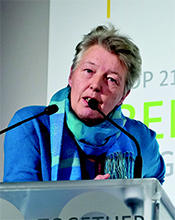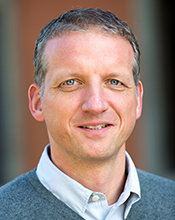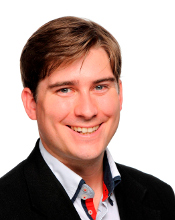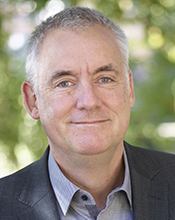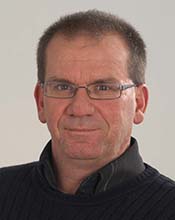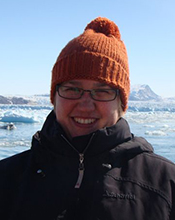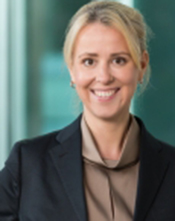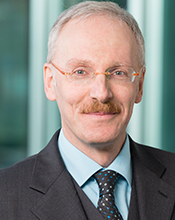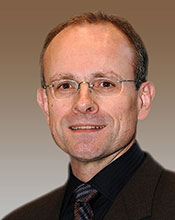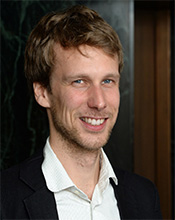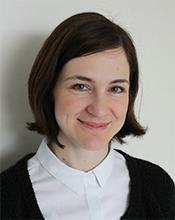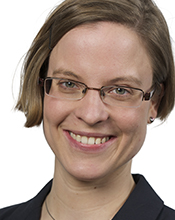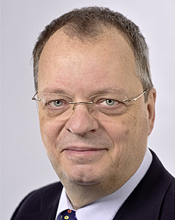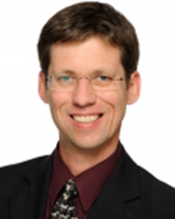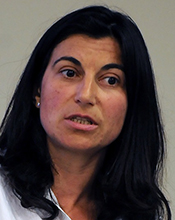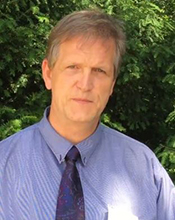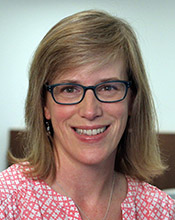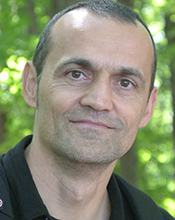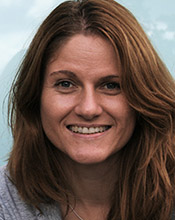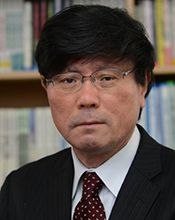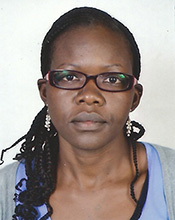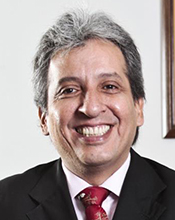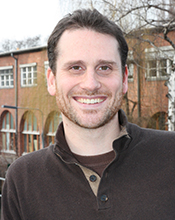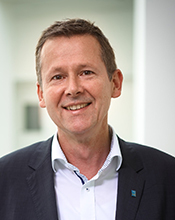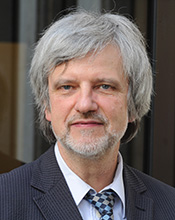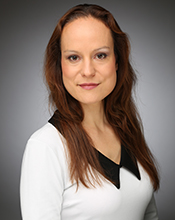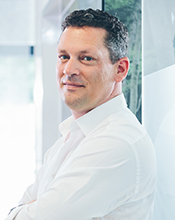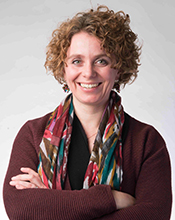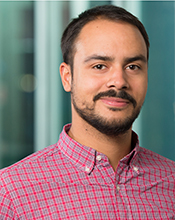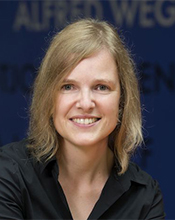Speaker 2017
Speakers
We will present the list of speakers with a short bio in alphabetical order to give you an overview about their individual field of professional expertise.
Please, note that this section will be updated regularly!
Last update: 05.09.2017
Gotelind Alber
is an independent researcher and advisor on sustainable energy and climate change policy with a special focus on gender issues, climate justice and multi-level governance. She is co-founder and board member of the global network GenderCC-Women for Climate Justice, and has served several years as focal point of the Women and Gender UNFCCC observer constituency.
She holds an advanced university degree in physics and has 30 years of working experience in research, policy and management, among others as managing director of the Climate Alliance of European Cities. Her current work focuses on the integration of gender dimensions into urban climate policy.
Rainald Borck
is professor of public economics at University of Potsdam. He received his PhD and habilitation from Humboldt University. He has held teaching and research positions at Humboldt University, DIW Berlin, University of Munich and University of Passau. He is a research fellow at CESifo and DIW Berlin. His research interests include urban and regional economics, public economics and environmental economics.
Thomas Bruhn
is a physicist working trans disciplinarily at the IASS since 2012 who is interested in the relation between humankind and the earth system in the light of the Anthropocene. He is co-leading the project AMA (A Mindset for the Anthropocene) on how the cultivation of qualities like mindfulness and compassion can contribute to sustainability and also investigates co-creative processes in the context of political decision making. Before joining the IASS he did research on semiconductor nanostructures in Berlin, Rome and Marseille. He is also a trained facilitator and is a member to the thinktank30 of the Club of Rome and member of the BOD of the Global Contract Foundation.
Tim Butler
obtained his PhD in 2003 at the University of Melbourne, Australia on the topic of the global atmospheric methane budget. After several years of postdoctoral research experience at the Max Plank Institute for Chemistry in Mainz, Germany, he joined IASS Potsdam to lead a research group with a focus on air pollution modelling. He is also a guest professor at the FU Berlin.
Bernhard Diekmann
is head of the Research Unit Potsdam at the Alfred Wegener Institute Helmholtz Centre for Polar and Marine Research (AWI) and adjunct Professor for Quaternary Geology at Potsdam University, Institute of Earth and Environmental Science. He has a long-lasting expertise on geological, environmental, and climate research in cold regions. Another important task is to foster outreach activities to public audience. Latest international projects in Siberia, the Tibetan Plateau, the Bering Sea, and the Antarctic Ocean dealt with environmental changes since the last ice age, providing important knowledge for a better understanding of future global change.
Kevin Fleming
completed a BSc Hons at the University of New England, Australia, and a MAppSc at the Western Australian School of Mines. After working as an exploration geophysicist, he undertook a MPhil at the University of Cambridge, and then worked as an environmental geophysicist in Sydney. After doctoral studies at the Australian National University, he went to the GFZ GeoForschungsZentrum in Potsdam as a postdoctoral researcher and research project manager. He then was a researcher at Curtin University in Perth, Australia, before returning to GFZ as a project manager and senior researcher. His research interests include earthquake early warning, multi-type hazard and risk concepts, and geophysical interpretation of space observations.
Gerlis Fugmann
is currently the Executive Director of the Association of Polar Early Career Scientists (APECS) based since February 2017 at the Alfred Wegener Institute, Helmholtz Center for Polar and Marine Research in Potsdam, Germany. Before she was based in the same position and as project leader at the UiT The Arctic University of Norway in Tromø, Norway from October 2013. She completed her PhD in Geography at the Justus Liebig University Giessen in Germany in 2011 and worked afterwards for two years as a post-doctoral researcher at the International Centre for Northern Governance and Development (ICNGD) at the University of Saskatchewan in Canada. Her research focused on projects in the Canadian Arctic and Sub-Arctic as well as Northern Scandinavia, addressing questions of comparative economic development, entrepreneurship, tourism, resource development and Northern engagement and participation in innovation and the knowledge economy.
Viola Gerlach
is scientific associate to Prof. Ortwin Renn since May 2016. She holds an MA and studied Political Sciences and Sociology at the University of Stuttgart and Universitá degli Studi di Firenze, Florence, Italy. Her main research focus is on risk perception and risk communication. She has built up extensive scientific knowledge, relating especially to climate change, natural hazards and energy policy. She also offers considerable expertise in conceptualizing dialogue formats and has more than 10 years’ experience in facilitating transdisciplinary dialogues.
Armin Haas
is a senior researcher in the Systemic Risk project of the Institute for Advanced Sustainability Studies, Potsdam (IASS), and leads the IASS activities within the EU Horizon 2020 projects Dolfins and Green-Win. Moreover, he leads the research line Integrated Risk Governance of the Global Climate Forum (GCF). At IASS his main research foci concern the economic, ecological and social sustainability of the financial system, and innovative contributions to the management and governance of systemic risks. At GCF, his research focuses on innovative approaches for the management of large-scale complex uncertainties. He holds a Ph.D. in economics from the University of Karlsruhe, Germany. Before joining IASS, he worked as senior scientist at the Potsdam Institute for Climate Impact Research (PIK) and headed the research group Bayesian Risk Management.
Arnd Heumann
is staff member of the scientific executive board at GFZ German Research Centre for Geosciences, where he has worked in various capacities in the field of geoenergy since 2010. Before joining GFZ he was technology transfer coordinator at the Office for Geothermal Energy of the EnergyAgency.NRW. He was also manager of the Geothermal Energy Network integrated in the structure of EnergyRegion.NRW, the energy economy cluster of the state of North Rhine-Westphalia. His academic qualifications include a MSc in Geology from Johannes Gutenberg University Mainz and a PhD in Earth Sciences from VU University Amsterdam.
Thomas Hickmann
is a Post-Doctoral Researcher and Lecturer at the Chair of International Politics, University of Potsdam. His main research interests include global environmental and development politics, the role and function of transnational actors in world politics, and the interplay of international bureaucracies with non-state actors. He teaches at both BA and MA level on various topics related to global public policy-making. In September 2015, he was elected a member of the steering committee of the working group Environmental Politics and Global Change of the German Political Science Association (DVPW).
Jasmin Honold
is a scientific employee at the German Institute of Urban Affairs (difu) in Berlin since 2016, where she focuses on sustainable urban development with an integrated perspective and municipal data/statistics. She achieved her doctoral degree in the graduate research program “Perspectives on Urban Ecology III” funded by the German Research Foundation (DFG). Further academic experiences include research positions at the chair of health sociology/Universität Potsdam and plant ecology/TU
Berlin, as well as lectureships at Hochschule Bochum and Leuphana Universität Lüneburg. J. Honold studied Psychology at Goethe Universität Frankfurt/Main and Universiteit van Amsterdam.
Kathrin Stephen
is Scientific Project Leader at the Institute for Advanced Sustainability Studies (IASS) in Potsdam, Germany, where she leads the Arctic research project GloCAST (Global Change and Arctic Sustainable Transformations). GloCAST uses the Arctic as a prominent case to illustrate interrelations between global and regional change processes and between stakeholders from within and outside the Arctic. Kathrin received her Ph.D. in Political Science from the Freie Universitaet Berlin. She is Senior Fellow of The Arctic Institute – Center for Circumpolar Security Studies and part of the German observer delegation to the Sustainable Development Working Group of the Arctic Council.
R. Andreas Kraemer
Founder of Ecologic Institute, is currently Senior Fellow at Institute for Advanced Sustainability Studies (IASS Potsdam) and the Centre for International Governance Innovation (CIGI), Canada, non-executive Director of the Fundação Oceano Azul, Portugal, and Visiting Assistant Professor of Political Science and Adjunct Professor of German Studies at Duke University.
In 2015, he was Visiting Scholar at the MIT. His research focuses on the theory and practice of think tanks and how they function in different political systems, the interactions among policy domains and international relations, and global governance on environment, resources, climate and energy.
Elmar Kriegler
is a senior scientist at the Potsdam Institute for Climate Impact Research (PIK) and vice chair of Research Domain “Sustainable Solutions. His research focuses on the integrated assessment of climate change, scenario analysis and decision making under uncertainty. He has coordinated several international projects on integrated assessment modeling and mitigation scenarios. He has been a lead author of the IPCC Fifth Assessment Report and is currently serving as lead author for the IPCC Special Report on 1.5 degrees warming. Elmar Kriegler earned a diploma in Physics at the University of Freiburg, and a Ph.D. in Physics at the University of Potsdam, Germany. He was a Marie Curie Fellow at the department of Engineering and Public Policy at Carnegie Mellon University.
Jürgen Kropp
Prof. Dr. Jürgen Kropp started his academic career after serving 9 years as a police officer for the state of Lower Saxony/Germany. He studied chemistry and physics and finished his PhD in theoretical physics at the University of Potsdam. At Potsdam Institute for Climate Impact Research he heads the Research Area on Climate Change & Development and acts as deputy chair of the Research Domain II: Climate Impacts and Vulnerabilities. His research is devoted to climate impact research and environmental systems science, e.g. how cities and societies may evolve and which role they play in terms of the transformation and sustainability challenge. Juergen was honoured by the renowned CleanTechMedia award for the foundation of the Climate Media Factory Potsdam, an innovative media lab which deals with modern science communication.
Petra Kuenkel
is an accomplished author and a leading strategic advisor to pioneering international multi-stakeholder initiatives that tackle common goods and sustainability issues. As a Member of the Club of Rome and the Co-Founder and Executive Director of the Collective Leadership Institute, she promotes the scaling-up of global transformation and system’s theory awareness as well as leadership and collaboration skills for people from the private sector, public sector and civil society. She is a thought leader on re-inventing leadership as a collective competence and her practical work is grounded in living systems and complexity science. She has a profound background in conceptualizing leadership development in multinational corporations and in dialogic change as an approach to transformation in complex social systems. Furthermore, she wrote several publications, for example the ground-breaking book “The Art of Leading Collectively”, published in the US by Chelsea Green Publishing.
Petra Kuenkel created the Collective Leadership Compass – a systemic meta-level guiding tool for navigating complex change in a collaborative way to enhance the 2030 Agenda for the UN Sustainable Development Goals. It focuses on invigorating co-creative human interaction patterns as core drivers of transition processes and empowers leaders and change agents to navigate collaboration and multi-stakeholder initiatives successfully into a sustainable future.
The overarching topic of the Potsdam Summer School 2017 is “Human Environments in a Changing World” – let’s move from our common visions to implementation and realize Sustainability together.
Mark Lawrence
Prof. Dr. Mark Lawrence is managing scientific director at the Institute for Advanced Sustainability Studies (IASS) in Potsdam, focusing on mitigating the impacts of short-lived, climate-forcing pollutants (SLCPs), and on the potential impacts, uncertainties and risks of “climate engineering”.
He received his Ph.D. in 1996 from the Georgia Institute of Technology. From 2000 until 2011 he was a research group leader at the Max Planck Institute for Chemistry in Mainz. He served as interim professor for meteorology at the University of Mainz during 2009-2010, and moved to the IASS in 2011. In 2014 he was appointed Honorary Professor at the University of Potsdam.
Mark Lawrence is author or co-author of over 130 peer-reviewed publications. He has led various international projects, has served as editor for two journals (Atmospheric Chemistry and Physics; Atmospheric Environment), and is on several international committees, including being co-chair of the International Global Atmospheric Chemistry program (IGAC).
Diana Mangalagiu
is Professor at the Environmental Change Institute, University of Oxford and Sciences Po Paris. She has a dual background, in both natural sciences (Ph.D. Artificial Intelligence, Ecole Polytechnique, MSc Physics) and social sciences (MSc Sociology, MSc Management).
Diana has two decades of research, teaching and advising experience in sustainability and articulation of environmental and economic policies in corporate and public policy settings addressed through modelling, stakeholder-based inquiry and foresight approaches and authored numerous scientific articles and books. She co-founded the Initiative for Science, Society and Policy Dialogue, is a scientific board member of the Global Climate Forum, Integrated Risk Governance Project and Co-Chair of the Global Environmental Outlook, UNEP.
Joerg Mayer-Ries
Between 1979 and 1982 Joerg Mayer-Ries studied Business Economics, Political Economy, Political Science and Sociology at Augsburg University and from 1982 to 1984 Business Economics and Political Economy in Oldenburg. He finished his studies with diploma in Political Economy. Later on during his professional career he finished his PhD. in Political Economy at the FU Berlin, focusing on emerging transnational regimes for climate and rainforest policy.
Concerning professional experience, Mayer-Ries worked as a research and teaching assistant at the Institute for Political Economy (University of Oldenburg) from 1984 until 1989. Between 1990 and 1998 he was Director of Studies for Economic, Environmental, Regional and North-South-Policy at the Lutheran Academy at Loccum and Berlin. Subsequently, he worked until 2007 as Senior Consultant for Sustainability Policy, Innovation and Research Policy at IFOK, Institute for Organisational Communication, Berlin, a private business consulting.
Since 2007 Joerg Mayer-Ries is Head of Division for General Aspects of Environmental and Sustainability Policy in the Federal Ministry for the Environment, Nature Conservation, Building and Nuclear Safety. On behalf of the Federal Ministry he will work during 2017 as Guest Senior Fellow at the Institute of Advanced Sustainability Studies (IASS) at Potsdam (Germany) and Guest Senior Scientist at the Potsdam Institute for Climate Impact Research (PIK).
Katherine McComas
is a Professor in the Department of Communication at Cornell University, where she specializes in risk, science, and environmental communication. Her research and teaching focus on understanding motivations and barriers surrounding communication about scientific and environmental risk issues, where she focuses particularly on how risk communication influences people’s attitudes and behaviors. She is the author or coauthor of 70+ refereed journal articles and two books, including co-editing the SAGE Handbook of Risk Communication. She currently serves as the Area Editor for Risk Communication for the journal Risk Analysis, and in 2014, she was elected a Fellow for the Society for Risk Analysis. Katherine holds a PhD in Philosophy from Cornell University.
Bruno Merz
is head of the Section “Hydrology” at the German Research Centre for Geosciences (GFZ) and Professor for Engineering Hydrology and Management of Georisks at the University of Potsdam. He is one of the internationally leading experts in flood risk assessment. His research includes risk analysis, and monitoring and simulation of hydrological and hydraulic processes. In 2017 he received the Plinius Medal of the European Geophysical Union for interdisciplinary natural hazard research. He acts as editor of “Natural Hazards and Earth System Science”, “Water Securit” and “Hydrologie und Wasserbewirtschaftung”.
Barbara Neumann
is a research associate with the Ocean Governance team at the Institute for Advanced Sustainability Studies (IASS) in Potsdam, Germany. She is further affiliated with Kiel University and the Cluster of Excellence “The Future Ocean” in Kiel. Trained as a geographer, her research interest and expertise is in human-environment interactions in coastal and marine areas, land-ocean interactions, and sustainable development and governance of coastal and marine systems. She has contributed to the 2017 ICSU report “A Guide to Interactions: From Science to Implementation” and the chapter analysing interactions, co-benefits and trade-offs of the ocean-SDG 14, inter alia. Barbara received her PhD in Geography from Saarland University in 2002.
Norio Okada
studied infrastructure planning, water resources management and systems methodology at Kyoto University, and received. B. Eng, M. Eng and Dr.Eng all from Kyoto University in 1970, 1972 and 1977. He worked at IIASA as research scholar from 1978 to 1980.
He is currently a Fellow at IASS. From the first of April 2016, he is Advisor to the Institute of Disaster Area Revitalization, Regrowth and Governance (IDiARRG), Kwansei Gakuin University, Japan. On March 31, 2016 he retired as Director of the above institute and Professor of Policy Studies, Kwansei Gakuin University, Japan. He is Professor Emeritus of Kyoto University and also visiting professor of Kumamoto University, Japan. From 1993 to 2012 he was Professor of Kyoto University and between 2009 and 2011 he was Director of Disaster Prevention Research Institute (DPRI), Kyoto University. From 1977 to 1992 he was associate professor and professor at Tottori University, Japan.
He was visiting professor at several universities such as Disaster and Development Centre, Northumbria University, New Castle upon Tyne, UK, University of Waterloo, Ont., Canada, University of Natural Resources and Life Sciences, Vienna, Austria, and Beijing Normal University, Beijing, China His major research interests are twofold: 1) Methodological development and application 2) field-based research for planning and management of physical and human systems, particularly related to natural disasters, the environment, water resources and infrastructure systems. His methodological foci include i) risk management and governance, ii) conflict management and game theoretic approaches, and iii) adaptive management of complex systems under high uncertainty as well as iv) stakeholder-involved participatory approach.
Since 2001, he has been leading an extensive international research initiative to establish a new cross-disciplinary research area called Integrated Disaster Risk Management, by organizing a series of international conferences and workshops in collaboration with IIASA, Austria. This research initiative has resulted in the formation of the new academic society called “The International Society for Integrated Disaster Risk Management (IDRiM Society) of which he has become elected as the first President and re-elected and was in office until April, 2017.
Lydia Olaka
is a lecturer and postdoctoral researcher at the University of Nairobi. She teaches BSc, MSc and PhD programs at the Department of Geology and Institute of Climate Change and Adaptation. She received her PhD in Geology from the University of Potsdam in 2011 and has been a Volkswagen Foundation fellow since then under the funding initiative Knowledge for tomorrow – focusing on “Resources, their Dynamics, and Sustainability – Capacity Development in Comparative and Integrated Approaches”.
She is mainly interested in multidisciplinary studies on interactions between earth science and society, focusing on groundwater contaminant transport, impact of geogenic pollution on public health and impact of climate variability on water resources in E. Africa. She is a member of the Kenya National Young Academy of Sciences (KNYAS) and a member of other international professional bodies.
Manuel Pulgar-Vidal
is leader of WWF’s Global Climate & Energy Practice.
With 30 years of experience in environmental law and policy, he served as Minister of Environment of Peru (2011 to 2016) and President of UNFCCC’s COP20. In 1986 he founded the Peruvian Society for Environmental Law, an influential institution in Latin American, serving as its Executive Director for 20 years.
Mr Pulgar-Vidal holds a law degree from Pontificia Universidad Católica del Perú –where he is professor- and has concluded studies for a Master’s in Business Law at Universidad Peruana de Ciencias Aplicadas.
He is also a board member of Forest Trends, Amazon Conservation Association and Consultative Member of the Carbon Institute.
Rainer Quitzow
joined IASS in December 2014. His research focuses on sustainable innovation and industrial policy and governance of the energy transition in Germany and beyond. In particular, he has focused on the internationalization of emerging renewable energy industries and the changing role of emerging economies in this context. He regularly engages in policy-oriented advisory work for both German and international clients. Before his career as a researcher, Rainer Quitzow worked in the field of international development with a focus on governance, environmental and trade policy. At the World Bank in Washington, DC he conducted governance and policy impact analysis for the preparation of development programs in Latin America and Africa.
Volker Rachold
is the Head of the German Arctic Office, which serves as an information and cooperation platform between German stakeholders from science, politics and industry. His functions include managing the dialogue between German Arctic players, supporting the federal ministries interested in Arctic matters, coordinating Germany´s scientific input to the Arctic Council and planning and implementing national and international Arctic-related events and projects. Before moving to the German Arctic Office in 2017, he served as the Executive Secretary of the International Arctic Science Committee (IASC) since 2006. Dr. Rachold graduated as a geochemist from Göttingen University, where he also obtained his Ph.D. in 1994. Since then he worked with the Alfred Wegener Institute for Polar and Marine Research. His research focused on land-ocean interactions in the Siberian Arctic and he led several land- and ship-based Russian-German expeditions. He is author and editor of numerous scientific papers and serves as a reviewer for scientific journals and funding agencies.
Ortwin Renn
is scientific director at the Institute for Advanced Sustainability Studies (IASS) in Potsdam since February 2016. He seres as acting chair of the Stuttgart Research Center for Interdisciplinary Risk and Innovation Studies at the University of Stuttgart (ZIRIUS) and as scientific director of the non-profit company DIALOGIK, a research institute for the investigation of communication and participation processes. Renn is Adjunct Professor for “Integrated Risk Analysis” at Stavanger University (Norway), Affiliate Professor for “Risk Governance” at Beijing Normal University and Honorary Professor at the Technical University, Munich. Renn has published more than 30 monographs and over 150 peer reviewed articles. His most prominent publication is the book “Risk Governance. Coping with Uncertainty in a Complex World (London: Earthscan 2008).
Pia-Johanna Schweizer
Pia-Johanna Schweizer leads the interdisciplinary research project Systemic Risks at the Institute for Advanced Sustainability Studies (IASS) Potsdam in Germany. Pia holds a Ph.D. in Sociology from Stuttgart University. From 2011 until 2016, Pia coordinated the research unit “Planning & Governance” within the Helmholtz Alliance ENERGY-TRANS
and directed the project “Potentials and Limits of Discursive Approaches” at the Stuttgart Research Center for Interdisciplinary Risk and Innovation Studies (ZIRIUS) at the University of Stuttgart. She has been a visiting scholar at Michigan State University from 2013 to 2014. From 2015 until 2016 she has been Fellow of the Asian Energy Studies Center of Hong Kong Baptist University. Pia received the Chauncey Starr Distinguished Young Risk Analyst Award from Society for Risk Analysis in 2015.
Piet Sellke
For the past 12 years (since 2004) I have been working as researcher and consultant in the field of risk- and crisis communication, conflict resolution, mediation, risk governance, civic participation and discourse. I am a trained mediator and was in charge of a multitude of mediations and public participation processes in the field of environmental law. In my research activities I am focusing on how to shape governance processes in order to include the necessary stakeholders, experts and the public at large into an integrative framework. This work I have been applying to very different sectors, such as resilience of communities against disaster, conflict resolution and establishment of trust between citizens and government bodies and towards the private sector. My research in the field of risk governance encompasses risk communication, risk management, and risk perception as well as new approaches to deal with emerging risks. I have teaching positions at the University of Vienna (risk governance and crisis communication) and at the Steinbeis School of Innovation and Management (conflict resolution and change management). I am conducting trainings and workshops for public institutions as well as private companies on risk management, conflict resolution, dialogue techniques, mediation and communication.
Ariane Steinsmeier
Ariane has joined Rare in May 2015 as the Senior Director for Europe with the focus on advancing existing and building new partnerships in Europe to strengthen community-led solutions within conservation and climate change. Given Rare’s focus on empowering local communities to better protect and manage their natural resources, Ariane is also building a European network of partners from academia and practice to strengthen behaviour change approaches within conservation. Between 2011 and 2015, Ariane has been the lead of TNC’s global efforts around with the Convention for Biological Diversity (CBD) streamlining TNC’s work in the UN conventions with the common goal to strengthen the role of natural solutions to climate change. As an environmental sociologist by training, Ariane has worked at the Federal Agency for Nature Conservation in Bonn in the Department of Society and Sustainability (2002 until 2003) and as a senior policy advisor for biodiversity at the German Bundestag (2005 until 2009).
Patrick Toussaint
works as a research associate in the IASS project Implementation of the Paris Agreement (IPA). He is currently pursuing a PhD on equity and justice in international climate governance. He further holds a Master of Laws in international environmental law and policy from University College London and a Master of Science in environmental technology and international affairs from the Diplomatic Academy of Vienna and TU Vienna.
Bert de Vries
has a background in Theoretical Chemistry. He is co-founder and member of the Institute for Energy and Environment (IVEM) at the University of Groningen in The Netherlands, where he received his Ph.D. on sustainable resource use. Since 1990 he has been a senior scientist at the Netherlands Environmental Assessment Agency (PBL, formerly MNP and RIVM). Between 2003 and 2013 he has been Professor of Global Change and Energy at Utrecht University in The Netherlands (http://www.uu.nl/staff/BJMdeVries/0). He has contributed to and published extensively on resource and in particular energy analysis, modelling and policy; climate and global change modelling; and (complex) systems modelling for sustainable development. He has been actively involved in modelling and scenario construction for a.o. the Intergovernmental Panel on Climate Change (IPCC). At present, his interest and research is on worldviews and ethics in relation to sustainability and the connection between sustainable development and the financial system. He has co-edited several books, including Perspectives on Global Change: The TARGETS Approach (1997, Cambridge University Press) and Mappae Mundi: Humans and their Habitats in a Long-Term Socio-Ecological Perspective (2002, Amsterdam University Press). He published the textbook Sustainability Science, based on ten years of teaching the course Sustainable Development – An Integrating Perspective (2013, Cambridge University Press; see also www.sustainabilityscience.eu/textbook).
Kirstin Werner
During her PhD and postdoctoral fellowships at GEOMAR Helmholtz Centre for Ocean Research (Kiel, Germany), the Institute of Arctic and Alpine Research (Boulder, Colorado, USA), and the Byrd Polar and Climate Research Center (Columbus, Ohio, USA), Kirstin Werner studied high-resolution sediment cores west of Spitsbergen in order to understand the variability of heat transfer to the Arctic Ocean and corresponding changes in the sea-ice extent during the past ca 12,000 years, including a strong warming event in the present, anthropogenically-influenced period. Now working as Project Officer in the International Coordination Office for Polar Prediction hosted by the Alfred Wegener Institute Helmholtz Centre for Polar and Marine Research in Bremerhaven, Germany, Kirstin is focusing on the science management aspects of activities related to short-term polar weather and climate variability during the Year of Polar Prediction (2017-2019, polarprediction.net). This two-year global activity initiated by the World Meteorological Organization aims to bring together scientists, operational forecasting centres, and users of polar forecasts to advance polar prediction capabilities to reduce risk and improve safety management in polar regions and beyond. Kirstin currently completes her on-the-job master studies in Science Marketing at the Technical University Berlin. (Copyright: Martina Buchholz/Alfred Wegener Institute)
